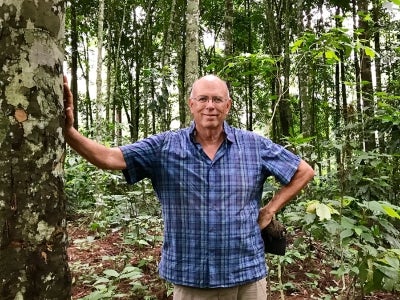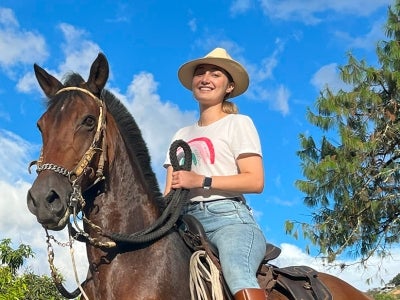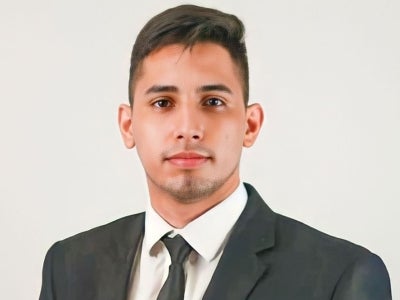
Laksmi Dhewanthi, GEF Operational Focal Point for Indonesia, speaking at a GEF-6 workshop
Laksmi Dhewanthi is Indonesia’s Operational Focal Point to the Global Environment Facility and a Senior Advisor to the Indonesian Minister of Environment and Forestry. In an interview, she reflects on the role nature-based solutions can play in an inclusive green recovery, and the need to take care of forest and indigenous communities, women, and young people in a difficult time.
What are the most important environmental issues facing Indonesia?
Water pollution, sustainable natural resources management, and conserving biodiversity are our biggest challenges. The negative impact of the current pandemic has made this work harder.
How has COVID-19 impacted your work?
The lockdowns and the fact that we need to keep a social distance have limited our activities – it has affected efforts to conserve biodiversity and our actions to manage natural resources. Our officers on the ground cannot do the daily monitoring they previously did. At the same time, people living in communities surrounding the forest have been economically hit by the pandemic. They need to eat, and there’s a forest nearby as a source of support, so to be successful in our environmental goals we need to be aware of their needs. It has been very challenging for our communities.
We know the environmental sector will contribute to the post-COVID recovery, and we are working with this in mind. One initiative underway in our ministry relates to the replanting of mangroves. This work has two elements. One is the economic recovery program, because the farmers who participate in the program will get paid weekly, giving them money to survive during the pandemic. The other piece is environmental rehabilitation, because by replanting mangroves, the ecosystems will benefit. I just came back from North Sulawesi, where I visited the area where farmers are replanting mangroves and talked with them about how the program is benefiting them economically during this pandemic.
How is Indonesia supporting a green recovery?
We need to have a mix of policy tools. We need to have policies in place that go to the sustainable development and sustainable management of the resources. That’s one element. The other element is how we engage all the stakeholders at all levels. Indonesia is a huge country with various challenges. We have various types of ecosystems, and communities who live in or nearby ecosystems may have different ways of tackling the issues. We need to listen to and learn from them.
How is the GEF helping you with these goals?
Indonesia has been part of the GEF since it was launched 30 years ago. As the funding mechanism for UN environmental conventions, the GEF has contributed considerably to Indonesia’s environmental protection and management, especially in the areas of biodiversity, climate change, land degradation, and desertification. I myself have been engaged with the GEF for about 12 years.

Labor-intensive mangrove planting in Southeast Minhasa, North Sulawesi, Indonesia as part of the Indonesian National Economic Recovery Program from the COVID-19 pandemic. Photo courtesy of Laksmi Dhewanthi
Is there a GEF-supported project that is close to your heart?
I love all the projects that contribute to environmental protection and management. Indonesia is committed to addressing climate change and to fulfilling its target as part of implementation of the Paris Agreement. To reduce emissions, our nationally determined contribution targets 800,000 hectares of land rehabilitation annually - so that’s 4 million hectares over five years. I’m happy to say that the GEF is supporting our efforts in this regard.
At the project level, we have benefited from GEF support for many efforts related to environmental protection and management. We have a tiger project focused on the Sumatra islands, and additional efforts to support biological corridors and avoid habitat fragmentation so that endangered species can move from one habitat to another. The GEF has also supported important projects to improve the sustainability of watershed land management as well as agriculture, focusing on avoiding land degradation and prioritizing climate change resilience.
I also love the GEF Small Grants Programme, which engages at a very local level with on-the-ground support. It tackles an important challenge: how to transform big strategic policy and program ideas into very concrete activities at the local level that provide real benefits - economic, social, as well as the ecological benefits - for the people and for the community. I believe when tackling environmental challenges, we need to think globally, but act locally.
How did you first become interested in environmental protection?
I grew up in Jakarta, our capital city, where there are a number of rivers. One of the biggest rivers is the Ciliwung River, which suffers from waste. I remember learning from one of my uncles about how the United Kingdom had cleaned up the Thames River and I thought that maybe I could someday contribute to cleaning up the Ciliwung the way people did there. Since then, and in my educational and career choices, I have tried to commit to working to improve the environment through good natural resource management. In my job in the environment and forestry ministry, I work to ensure that our policies have a positive effect.
What inspires you to keep going?
They say it takes a village to raise a child. I think it takes all of us to take care of the Earth. We need to consistently contribute to the protection and management of the environment. You should not stop until you are sure that your child and your grandchild will also receive as nice and beautiful an ecosystem as you did from your parents and your grandparents.
What would you like to see accomplished before you retire?
Maybe I will go back to my first dream: to see the Ciliwung River cleaned up. And not only the Chiliwung, but seeing other rivers, forests, mountains, and ecosystems be cleaner and healthier. I believe that we will get there.


